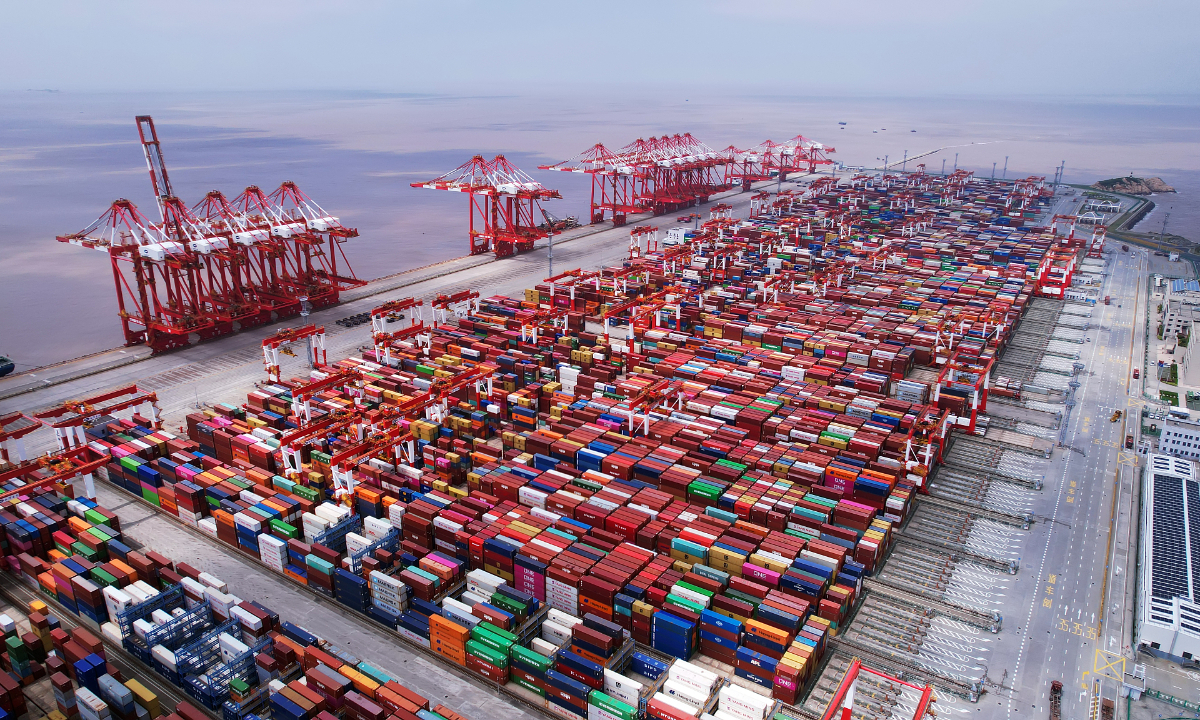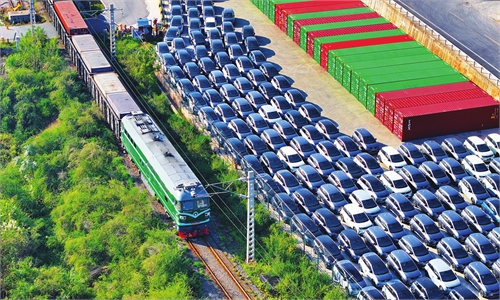
The photo taken on on April 21, 2023 shows Phase 4 automated terminal at Yangshan Port in Shanghai. Photo: VCG
China has reported a number of upbeat economic indicators on Friday, the latest sign that the world's second-largest economy has sustained recovery momentum in November even as downward pressure persists due to geopolitical tensions and a slowing property sector.
In November, China's value-added industrial output increased by 6.6 percent year-on-year, beating market expectations of 5.6 percent, according to data released by the National Bureau of Statistics (NBS) on Friday. The index is also higher than October’s reading of 4.6 percent.
Retail sales, a gauge of consumer spending, recorded a 10.1 percent growth in November in year-on-year terms, a significant growth from the 7.6 percent in October.
Urban surveyed unemployment rate was 5 percent in November, the same as in October, data released by the NBS showed.
As the macroeconomic policies have been showing effects in November, the Chinese economy has continued to recover and progress, NBS spokesperson Liu Aihua said at a press briefing on Friday. She noted that in the next phase, China will accelerate efforts to create a new pattern of development, strive to promote high-quality development, and intensify efforts on macro control, among other measures, to consolidate and boost the sound momentum of economic recovery.
“The sound performance of the economy is within expectations, as macro-policies continue to produce effects, manufacturers generally expand inventory at the end of a year and exports accelerate ahead of the Christmas,” Cao Heping, an economist at Peking University, told the Global Times.
As the economy maintains a strong recovery, the country’s GDP is expected reach 5 percent in the fourth quarter, Cao said, expressing full confidence that the country is able to achieve its annual GDP target of around 5 percent this year.
In November, the International Monetary Fund said China's economy is set to grow at 5.4 percent this year, making an upward revision to its earlier forecast of 5 percent.
Analysts also dismissed the Western media’s constant undermining of the Chinese economy, saying that there is no need to worry about its long-term stable development, adding that patience is needed for targeted policies to produce more effects.
“The Chinese economy remains resilient, with new productive forces, new economic areas and new business models showing rapid development,” Cao said.
Looking ahead, 2024 is a key year that will witness the rapid transformation of China’s economic structure, observers said, noting that with new technologies and areas of consumption expected to play a larger role in the country’s economy, the impact of real estate on overall economic development will likely diminish.
In the first 11 months of 2023, fixed-asset investment, an important measure of capital spending in China, rose 2.9 percent on the yearly basis. Among which, investment in the real estate development was down by 9.4 percent, reflecting a continued downward pressure.
In a targeted effort to bolster the real estate market, Beijing and Shanghai municipal governments on Thursday made major adjustments, including lowering down payment requirements and cutting mortgage interest rates, in a bid to better support demand for first-home purchases and demand for upgraded housing.
The moves issued by the two major Chinese cities will greatly reduce the financial burden on home buyers, and help boost home sales and stabilize the real estate market, according to industry analysts.
Deng Haiqing, chief economist from AVIC Fund Management Co, told the Global Times that expanding domestic demand, deepening supply-side structural reforms, coordinating new urbanization initiatives and rural development, while coordinating high-quality growth and economic security will be three important points in the country’s policy planning for next year.
The Central Economic Work Conference held in Beijing from Monday to Tuesday stressed the need to advance the development of the private sector and to encourage small and medium-sized enterprises to develop unique and proprietary technologies to boost economic innovation.
In regard, Deng said local governments should earnestly implement policies that are already rolled out, while coming up with more detailed policies to elevate the confidence of entrepreneurs and stimulate the vitality of the private sector.


